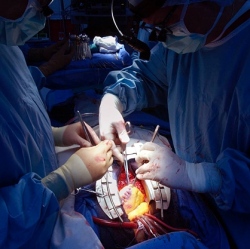
Scientists in Japan have developed a sticky sheet of tiny sensors that can be put directly on moving joints, beating hearts or other living tissues. The invention opens up the possibility of implanting almost unnoticeable sensors inside the body, letting doctors keep a close eye on a dodgy heart, for example.
"Just by applying to the body like a compress, our novel sheet sensor detects biometric information extremely accurately," researchers at the University of Tokyo said in a statement Friday.
The secret is an adhesive gel that prevents a fine grid of sensors from slipping, even if the thing they are in contact with is moving, said the team led by professor Takao Someya at the Department of Electrical Engineering and Information Systems. Conventional devices often use silicon and other relatively rigid materials, which can be uncomfortable for wearers.
Sensors are printed at 4 millimetre (a sixth of an inch) intervals on very thin plastic. This allows the manufacturer to get as many as 144 individual sensors on a sheet just a little bigger than an after dinner mint. Their proximity to the organ or joint they are measuring means they are able to take highly accurate readings. The sticky sheets could be used in healthcare or sports science, the team said.
